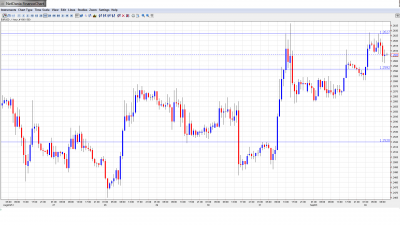EUR/USD edged upwards on thin trading, as the US marked the unofficial end of summer with the Labor Day long weekend. After Bernanke’s disappointing speech in Jackson Hole last week, market attention has shifted to Europe, where the ECB holds an important policy meeting on September 6. In todays’s economic news, the markets woke up to a dismal unemployment release out of Spain. There are a host of releases out of the US, highlighted by ISM Manufacturing PMI.
Here’s an update about technical lines, fundamental indicators and sentiment regarding EUR/USD.
EUR/USD Technical
- Asian session: Euro/dollar moved higher, touching 1.2628 before consolidating at 1.2607. The pair is unchanged in the European session.
- Current range: 1.2587 to 1.2623.
Further levels in both directions:
- Below: 1.2587, 1.2520, 1.2440, 1.24, 1.2360, 1.2330, 1.2250, 1.22, 1.2144, 1.2043, 1.20, 1.1876 and 1.17.
- Above: 1.2623, 1.2670, 1.2743 and 1.2814.
- 1.2587 has reverted to providing support.
- 1.2623 has weakened in resistance as the pair edges higher.
Euro/Dollar edges higher as markets eye ECB meeting – click on the graph to enlarge.
EUR/USD Fundamentals
- 7:00 Spanish Unemployment Change. Actual 38.2K.
- 9:00 Euro-zone PPI. Actual 0.4%. Exp. 0.3%.
- 13:00 US Final Manufacturing PMI. Exp. 51.9 points.
- 14:00 US ISM Manufacturing PMI. Exp. 50.0 points. See how to trade this event with USD/JPY.
- 14:00 US Construction Spending. Exp. 0.4%.
- 14:00 US ISM Manufacturing Prices. Exp. 46.4 points.
- All Day: US Total Vehicle Sales. Exp. 14.1M.
EUR/USD Sentiment
- Bernanke delivers more of the same at Jackson Point: If expectations were low prior to Bernard Berananke’s remarks at the Federal Reserve symposium in Jackson Point, then he certainly didn’t disappoint. In a highly-anticipated speech, the Fed chief dished out little more than what he’s been saying for months – the Fed was closely monitoring the US economy, and was willing to intervene and stimulate the economy with easing measures if conditions worsened. In other words, the Fed will continue to cling to the sidelines and there will be no QE3 in September.
- Euro gains after Draghi’s promises: With Jackson Hole behind us and nothing new from the Fed, the market focus has shifted to Brussels this week. ECB President Mario Draghi spoke to a parliamentary committee in Brussels on Monday. The meeting was supposed to take place behind “closed doors”, but some committee members were unable to abide, as details of the meeting were leaked to the media. Draghi apparently provided some details about the ECB’s bond buying plan, including an option to buy 3 year bonds – 3 years is also the length of the ECB’s LTRO. The euro responded to the news with a mini-rally against the US dollar. On September 6, the ECB convenes for an important policy meeting and the interest rate announcement. The markets will be expecting some concrete proposals, and failure to deliver could sour market sentiment and send the euro tumbling.
- Spain continues to struggle: After Catalonia asked for 5 billion euros of aid, also its southern neighbor joined in. This adds pressure on the central government to hurry up and ask for aid. In an ominous development, a senior Spanish military officer threatened that any unilateral steps by Catalonia towards independence would be met with military force. Meanwhile, there was more bad news on the economic front, as the number of unemployed people rose 0.8% in August. This was the first increase in five months, and with the tourist season winding down, we could see another weak release for September.
- Slovak surprise: Prime Minister Robert Fico of Slovakia surprised the markets with a statement about a 50/50% chance of a euro breakup. Slovakia, a member of the euro-zone, has taken its time in the past with ratifying one of the deals. In Finland, another core country, the population is actually less euro skeptic than previously thought. The last thing the fragile euro needs right now is more zone members openly questioning the viability of the EZ.
- Bond markets want ECB to take action: Spanish and Italian yields are fairly steady in anticipation of the ECB blitz. Thursday’s Italian 10-year bonds are hovering around 5.82%, down from 5.96% in July. Recent Spanish 10-year yields are in the 6.65% range. This is certainly an improvement from the unsustainable rates above 7% which we saw in the summer. However, lots of talk and no action from the ECB this week could undermine investor confidence and send Spanish and Italian yields back up to dangerous levels.
- German officials express mixed views about the Grexit: It was refreshing to hear some German politicians talking about the geopolitical importance of Greece (a NATO member) and not only look at a Grexit from a pure economical view. However, discussions about a manageable Grexit are getting louder: this time from the ECB’s Jörg Assmussen, that echoed Eurogroup chief Juncker. German grumbling is growing over Greece’s request for an extension, and a senior member of the Christian Social Union, a coalition partner, said he saw Greece leaving the euro next year. Other coalition partners are dead set against providing Greece with more time or money. See how to trade the Grexit with EUR/USD.

